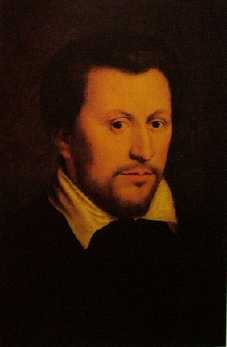Ben Jonson
Jonson, like Shakespeare, came from modest beginnings--his father was a bricklayer--but he was a man of great learning, widely read in both the Greek and Latin classical authors. Often contentious, even irascible, he was nonetheless generous in his estimation of Shakespeare's work.
Jonson must have known Shakespeare well. His first major success on the stage, Every Man in His Humour, was first acted in 1598; when the play was published in 1616 (the year of Shakespeare's death), the title- page included a list of "The principal Comoedians," and heading the list is "Will Shakespeare." (There is a tradition that Shakespeare acted the part of an old man, the elder Knowell.)
Jonson's plays
His great plays are his satirical comedies, especially Volpone (1606), Epicoene (1609), The Alchemist (1610), and Bartholomew Fair (1614); he wrote some fine poetry; and he was among the first to treat English writers seriously enough to write criticism of them.
Jonson's love of the classics led him to break with established conventions in the drama of his time. Sidney would have approved of the way that he carefully adhered to the "unities" in his plays, and of the way that he was more conscious of the classical distinction between comedy and tragedy* than others in the period.
One of Jonson's major innovations was the "comedy of humours." A humour (as in Renaissance psychology) was a quality of mind or mood which dominated a particular character. The effect is of exaggeration, a caricature. Characters like Malvolio in Twelfth Night, or Pistol in Henry V are "humorous" in this sense.
The Internet Shakespeare Editions offers an online version of Everyman in his Humor.
Footnotes
-
Playing by the rules
Jonson's tragedies, Sejanus and Cataline, have never been considered effective, mainly because he seems to have been too careful about the classical background: they follow meticulously the historical facts they are dramatizing, but the characters never come to life as they do in his comic masterpieces, and the language takes the best models, but succeeds only in being dry.
